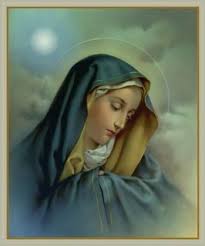Contemplating the Assumption of Mary
From Fr. Ed Lamp – August 15, 2021
Original Author Andy Alexander, S.J. – January 1, 2000
Mary looked over at John writing at his table and smiled. He had always looked so young and the years had not aged him very much. She could understand why Jesus had such a special place in his heart for John, with his gentle ways and his easy love for people.
She gathered her cloak around her against the cold and closed her eyes as she thought about the many years of her life. So much of it was beyond understanding and yet she believed it and accepted it. She had been given a courage, faith and humility that could only be a gift from God. How else could she have overcome her fears and said “Yes” when Gabriel asked her to be the mother of the Savior? Her son, Jesus, had been a wonder in her life. She had not always understood all of what he did but she knew he had a special role on earth. Their hearts had been bound together in faith and an unbreakable love. She had watched him leave home, teach, heal and challenge the authorities. Her heart had been pierced with such sorrow when he was arrested and tortured and finally put to death. Her faith in the Father had carried her through those days, and the incredible joy-filled days that came after.
“Imma?” John, said using the most intimate Hebrew form of “mother.” He laid a gentle hand on her shoulder. “You are so quiet these days.” She smiled at him with affection. “Dearest John, my life has been long and I have so much to be grateful for. These years together have been so full.”
It was true. In the weeks after he had risen, Jesus had spoken to them of a new order, a new way of life. She had resisted the urge to cling to him and not let him go again. She had to trust. “I will be with you always,” he had said. In her heart, she knew it was true and once again opened her life fully to God’s will. She had watched with joy as Jesus was taken up into the clouds. In the years that had followed, his message and life had given hope and meaning to a growing number of followers. She had spoken to so many of the disciples and followers in those times.
Jesus was in her life, too, in a vivid and very real way. She felt his presence with her as she grew tired. She spoke to him from her heart constantly, just as she did when he was on earth. She felt a strong connection that was as unexplainable as it was real. She closed her eyes again in thought.
“Imma,” came the familiar loving voice. “Blessed are you among women.” She knew it was different. She was not in John’s house but with Jesus, standing in a place that filled her with a different kind of joy. “My son,” she said softly as they embraced. She felt his cheek firmly against hers.
She did not know how or why. There were no questions and no answers for this. He had promised her she would be with him and the Father. She touched her body in wonder and knew she had been drawn to a different place by power not her own. It was her same body and yet different, more vibrant.
“You said ‘Yes’ to the Father’s request, Imma,” Jesus said to her. “Your life was prepared in a special way and you followed it with such faith. You made my work possible.”
Mary knew that somehow she was experiencing the resurrection in a way others would have to wait for. As she had so many times before, she paused and opened her heart in prayer. “The Almighty has done great things for me. Holy is his Name.”
In your prayers please remember the people of Haiti. Early reports say that the earthquake there (7.2 magnitude) caused catastrophic damage with many people still trapped in the rubble. We pray for the health and safety of everyone impacted and for the emergency responders and medical teams as they work during this devastating time to help people in the aftermath.
Continue Reading











